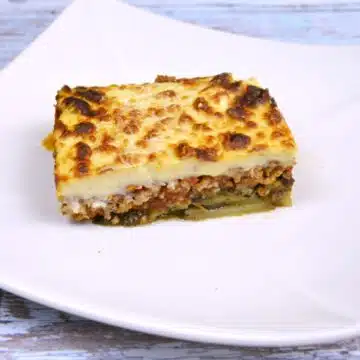Greek moussaka with eggplant and potatoes isn’t just dinner, it’s an adventure for your taste buds. It’s a trip to the sun-drenched Aegean Sea, a celebration of Greek culture, and a dish that will leave you wanting more. So, grab your ingredients, crank up some bouzouki music, and get ready to cook!

This Greek masterpiece sings with the melody of tender eggplant, savoury spiced meat, and creamy béchamel, each note perfectly harmonizing on a bed of crispy potatoes. It’s a symphony of textures and flavours, a journey for your taste buds to the sun-drenched shores of Greece.
Table of Contents
Why We Love the Greek Moussaka?
There are many reasons why people love Greek moussaka with eggplant and potatoes, and it goes beyond just the delicious taste. Here are some of the key factors that contribute to its popularity:
- Flavourful layers: The combination of savoury meat sauce, tender eggplant, creamy béchamel, and crispy potatoes creates a delightful interplay of textures and flavours. Each bite is a satisfying mix of richness, creaminess, and earthiness.
- Comfort food: Moussaka is essentially a warm and hearty casserole, making it perfect for cozy nights in or family gatherings. The familiar combination of ingredients evokes a sense of comfort and nostalgia.
- Traditional dish: Moussaka is a staple dish in Greece and many other Mediterranean countries, passed down through generations. It represents cultural heritage and evokes memories of family meals and celebrations.
- Relatively easy to make: While it requires some steps, the recipe is straightforward and achievable for home cooks with various levels of experience.
This is how some of my recipes, like Easy Potato Moussaka or my Best Eggplant Casserole (Timea’s Moussaka), were created. They have influences from Transylvania, which I highly recommend exploring. For example, my Turkish Moussaka uses ground pork instead beef and eggplant like the traditional version, but I replace the béchamel sauce with a tangy and refreshing yogurt sauce for a unique twist.
Ingredients
Each ingredient plays a vital role in creating the symphony of flavours and textures that has captured hearts (and stomachs) for generations. Let’s dive deeper into the magic behind these key players:
- 2 pcs of Eggplants (750 g): The star of the show, the eggplant transforms from its simple form into the foundation of the dish.
- 5 pcs Potatoes (500 g): They provide a satisfying crunch and earthiness, preventing the moussaka from becoming overly rich.
- 50 g Parmesan: Adds a salty, umami punch and a beautiful golden crust when baked, completing the moussaka masterpiece.
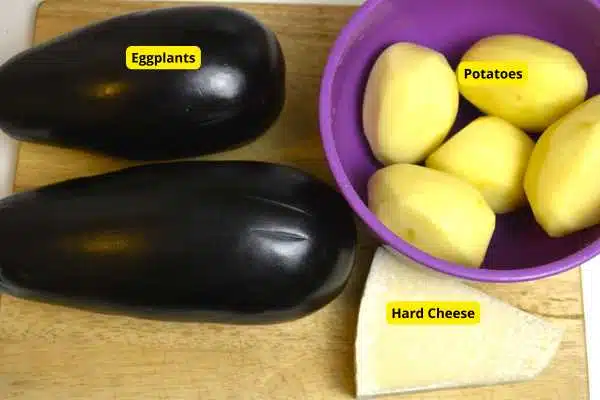
The Meat Sauce elevates the moussaka to a hearty and satisfying main course. In my recipe it contains:
- 500 g Lamb Mince: A traditional choice in Greece. Its rich, slightly gamy flavor adds depth and heartiness to the dish.
- One Onion and two cloves of Garlic form the base of a captivating melody of flavours.
- 400 g of Chopped Tomatoes bring acidity and freshness, balancing the richness of the meat.
- Spices like salt, ground pepper, cinnamon, allspices, and thyme add warmth, sweetness, and herbaceous notes.
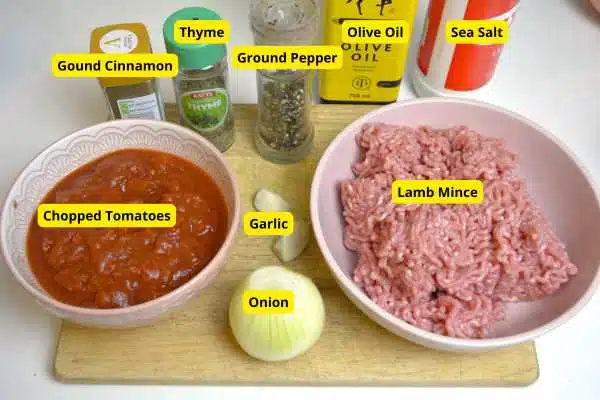
Luxurious and velvety, the béchamel sauce is the ultimate comfort food blanket. The béchamel sauce plays a crucial role, it adds a layer of richness and depth that elevates moussaka to a culinary masterpiece. Will contains:
- 100 g Butter: This adds richness and creaminess to the sauce. You can use unsalted butter and adjust the salt to your taste.
- 100 g Flour: All-purpose flour is typically used to create the roux, which thickens the sauce.
- 750 ml Milk: Traditionally, whole milk is used, but you can substitute with low-fat milk or even plant-based milks like oat or soy for a vegan option.
- 1/2 tsp of Salt & pepper: To season the sauce.
- Nutmeg: Adds a subtle warm, nutty flavour.
- Two Egg Yolks: Egg yolks can provide additional structure and stability to the sauce.
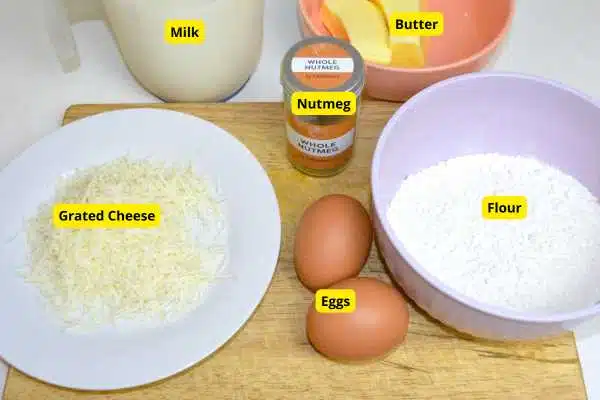
How to Make the Greek Moussaka With Eggplant and Potatoes?
Prepare the Ingredients
The way you prepare your potatoes for Greek moussaka can depend on your preferred texture and the specific recipe you’re following. Slice the potatoes evenly, ideally around 1/4 inch thick. This ensures even cooking and a pleasant bite.
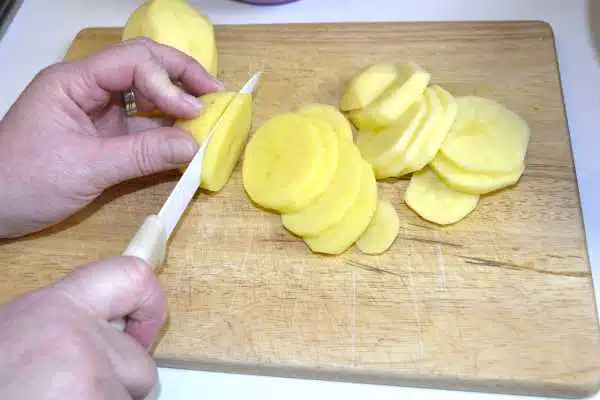
Put the potato slices in a bowl and season them with a teaspoon of sea salt, half a teaspoon of freshly ground black pepper, a teaspoon of dried thyme, and a tablespoon of extra virgin olive oil. Mix them so that the ingredients cover the potatoes evenly.
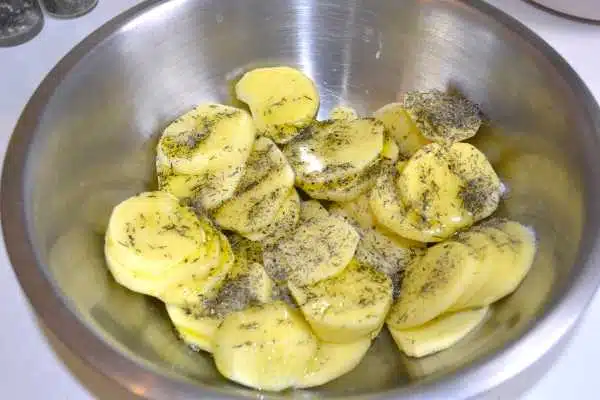
Slice the eggplants thinly, ideally around 1/2 inch thick. This ensures even cooking and a pleasant texture.
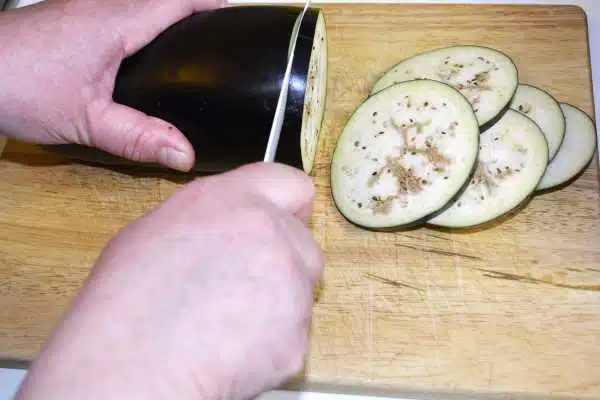
Place the eggplant slices in a bowl and season like the potatoes with sea salt, ground pepper, thyme and olive oil.
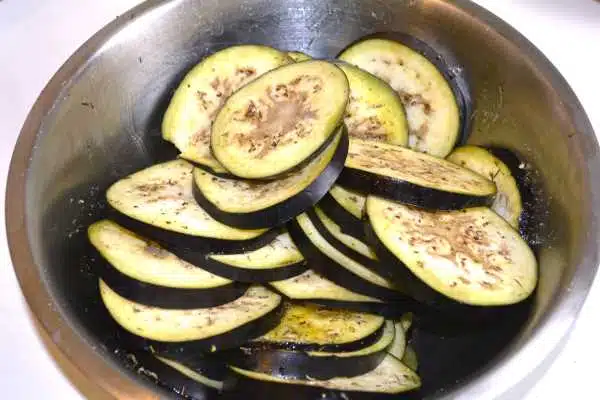
How to Make the Lamb Ragout?
In a large pan, heat two tablespoons of olive oil and saute a finely chopped onion and two cloves of garlic over medium heat until softened.
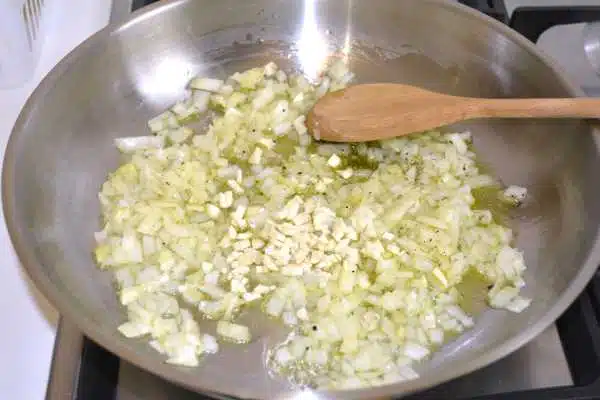
Add the minced lamb to the pan with the onion and cook, breaking it up with a spoon, until no longer pink and cooked through.
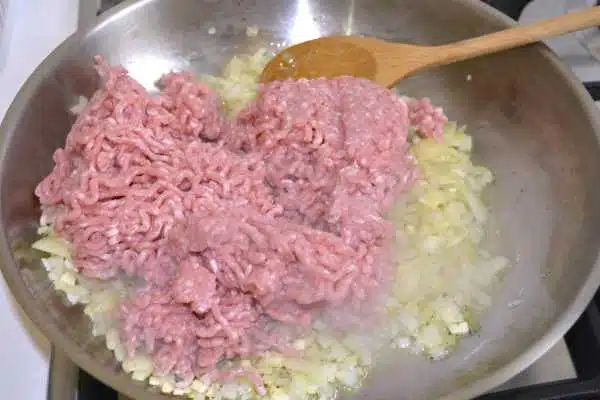
Season with 1 tsp sea salt, 1 tsp allspice, 1 tsp cinnamon, and 1 tsp dried thyme. Add a can of chopped tomatoes, drained and roughly crushed. Briefly cook the mixture, stirring occasionally, until the flavours meld and the sauce thickens slightly.
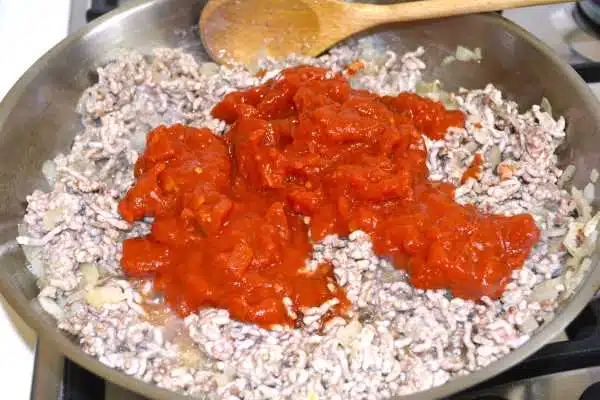
Add 100 ml of hot water to create a sauce and bring to a simmer. Cover the pan and cook for about half an hour, until the minced lamb is cooked.
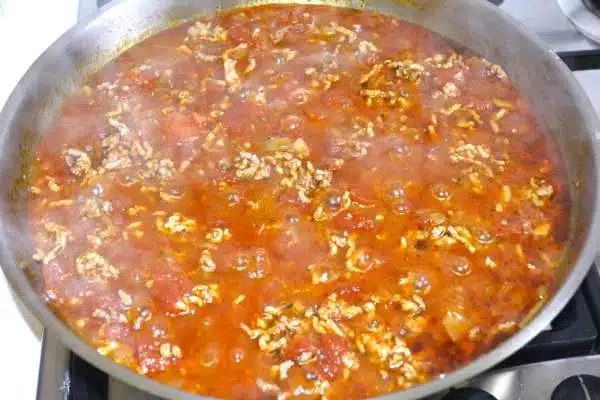
How to Make the Bechamel Sauce?
Let’s conquer the bechamel sauce! You’ll be surprised how simple it is. First, melt 100 g of unsalted butter in a saucepan over medium heat. Keep an eye on it as it melts, and we’ll move on to the next step!
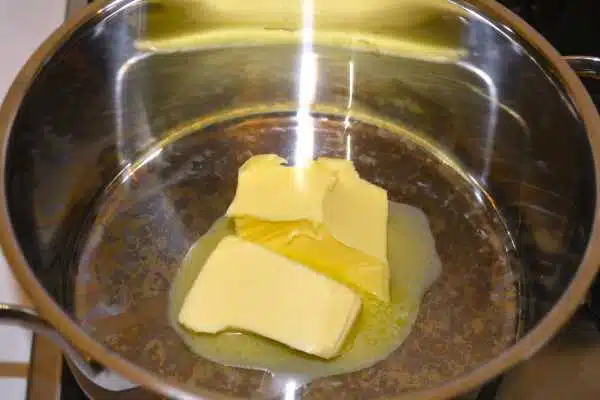
Next, whisk in 100 g (¾ cup) of all-purpose flour over medium-low heat. Cook, whisking constantly, until the mixture forms a smooth, pale yellow paste with no lumps. This is called a roux.
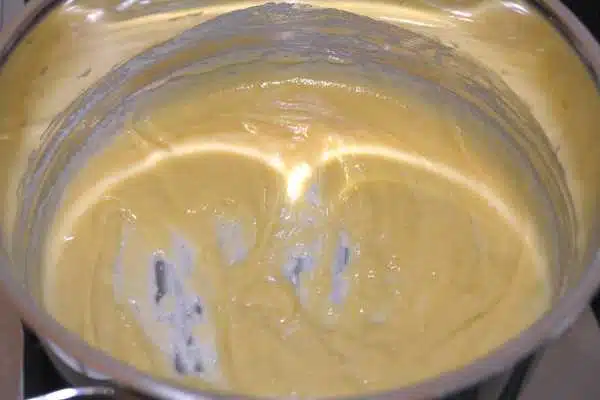
Gradually whisk in 750 ml (3 cups) of milk in small batches, whisking constantly after each addition until fully incorporated and smooth. Continue whisking over medium heat, around 180°F/82°C (simmering), until the sauce thickens and reaches your desired consistency.
Season with half a teaspoon each of sea salt and ground pepper, and a quarter of freshly ground nutmeg. Stir to combine the seasonings. Let the sauce cool slightly for about 15-20 minutes, or until it’s warm to the touch, before using it in your recipe.
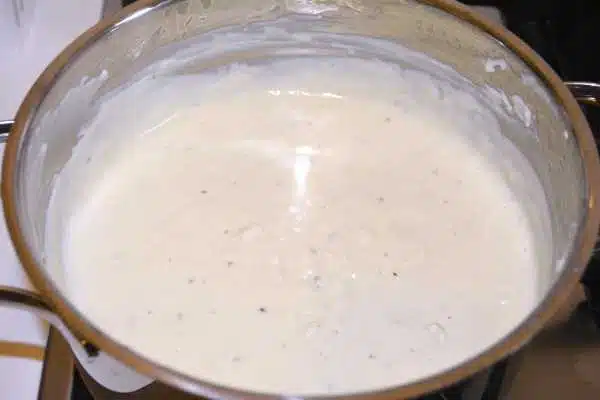
This is the basic bechamel sauce recipe, but for an extra creamy treat, I whisk in two egg yolks! Tempering them slowly ensures they don’t scramble. This little addition adds richness and creates a silky, smooth sauce that pairs perfectly with Greek moussaka. Feel free to adjust the amount of yolks to your taste preference.
Roast the Potato and the Eggplants
Choose a large baking sheet or casserole dish that can comfortably fit all your ingredients. Grease the bottom with 1 tablespoon of olive oil. Arrange the seasoned potato slices in a single layer, making sure they overlap slightly for even baking.
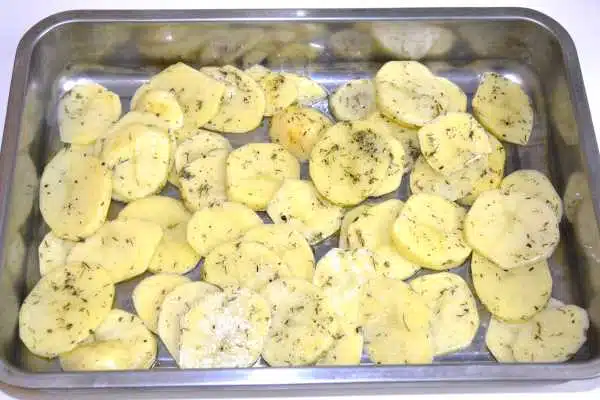
Place the baking sheet in the middle rack of your oven, preheated to 200°C (374°F). Bake for 20 minutes, or until the potatoes are golden brown and starting to crisp on the edges. The kitchen will start to fill with the warm aroma of roasted potatoes… delicious!
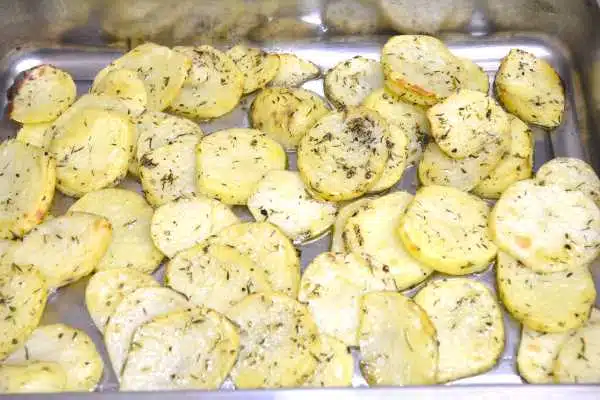
After 20 minutes, remove the tray from the oven. Arrange the seasoned eggplant slices in a single layer over the golden potatoes, creating a beautiful layered dish. Return the tray to the oven for another 20 minutes. The aroma of roasted eggplant will fill the kitchen as the dish continues to cook.
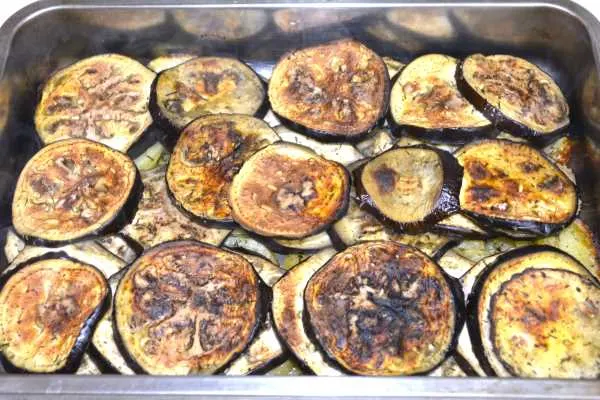
Layering and Bake the Greek Moussaka
Once the eggplants are golden and tender, we’ll add the next layer of our delicious moussaka! Spread all of the hot lamb ragu evenly over the eggplant slices, using the back of a spoon to create a smooth layer.
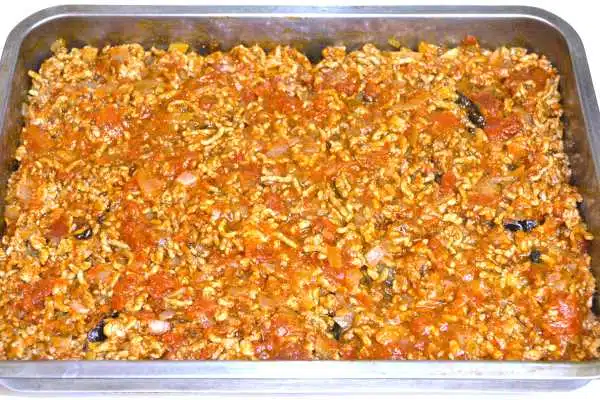
Now for the creamy goodness! Pour the warm bechamel sauce over the moussaka, using a spatula to spread it evenly in a smooth layer. The dish will be looking like a delicious masterpiece already! Top it generously with about 50 g of grated pecorino cheese, or another hard, aged cheese like parmesan, to your preference. Imagine the golden, cheesy crust that awaits…
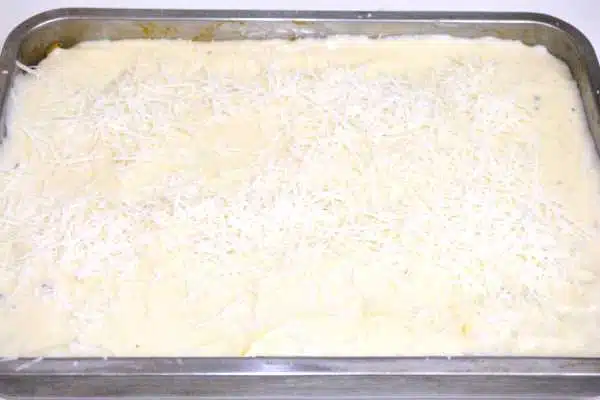
Bake the moussaka in a preheated oven at 190°C Fan (374°F) for 20-25 minutes, or until the cheese is golden brown and bubbly. The aroma will be irresistible! If you’re not a fan of pecorino, try parmesan or another hard cheese you enjoy.
The aroma of warm spices, creamy bechamel, and melted cheese will be irresistible. If you like, you can bake the dish for a few additional minutes to lightly brown the cheese topping and create a crispy golden crust.
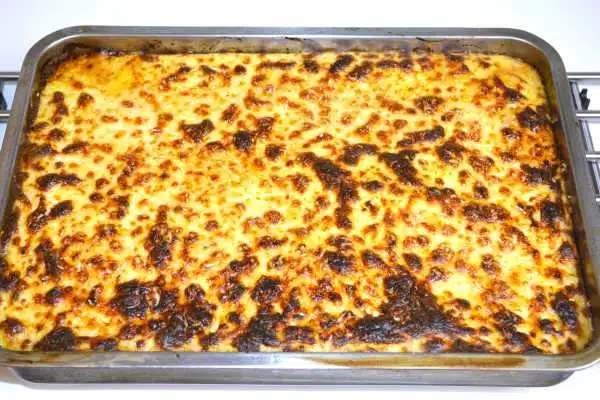
I created this recipe for Greek moussaka with eggplant and potatoes, and I warmly recommend it to anyone who loves the vibrant flavours of Mediterranean cuisine. It’s a perfect dish for a special occasion or a comforting weeknight meal. I hope you give it a try!
F.A.Q.
Do I need to peel the eggplant?
You don’t have to, but some prefer to remove the skin for a smoother texture. Salting and sweating the eggplant before cooking helps remove bitterness and excess moisture.
Can I use vegetarian meat substitutes?
Yes, lentil crumbles or other plant-based proteins can be used in place of meat.
What kind of eggplant is best for moussaka?
Choose firm, medium-sized eggplants with smooth skin and few blemishes. Globe or Italian eggplants are popular choices.
Serving the Moussaka
Traditionally, Greek moussaka is considered a complete meal in itself, so additional sides aren’t strictly necessary. Slice the moussaka into squares or wedges and arrange them on plates. Garnish with fresh herbs like parsley or dill for a pop of colour and drizzle with a little olive oil or lemon juice for extra flavour.
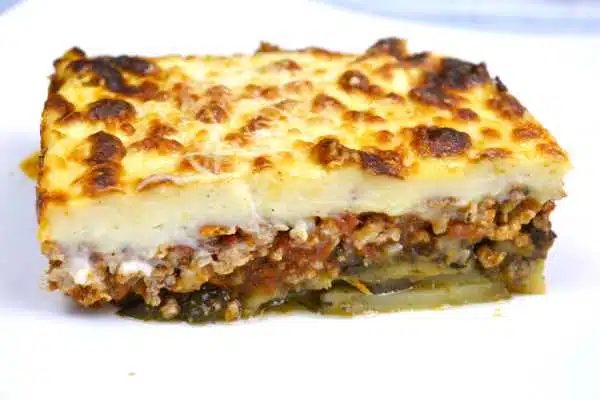
How to Store?
Allow the Greek moussaka to cool completely at room temperature for about 2 hours. Avoid rushing this process, as storing hot food can encourage bacterial growth. Once cool, cut the moussaka into individual portions and store them in airtight containers. Alternatively, wrap tightly in plastic wrap or aluminium foil.
Stored in the refrigerator, moussaka will stay safe and edible for up to 3 days.
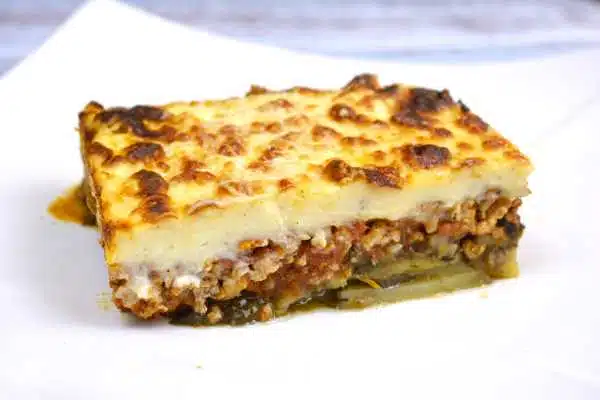
On this blog, you’ll find a collection of irresistible eggplant recipes that I wholeheartedly recommend. From classic Greek moussaka recipe to crispy eggplant fries and vegetarian wonders, there’s something for everyone! Come explore and discover your new favourite eggplant dish:
- Eggplant With Minced Pork
- Mediterranean Roasted Eggplant Recipe
- Grilled Eggplant Dip Recipe
- Best-Breaded Eggplant Recipe
Don’t miss out on the fun! Join our food community on Facebook, Twitter, and Instagram for mouth watering recipe inspiration, behind-the-scenes cooking tips on YouTube, and a chance to share your favourite dishes on Pinterest. We love connecting with fellow foodies and sharing our passion for delicious food. Join the journey!
Greek Moussaka With Eggplant and Potatoes
Equipment
- 1 large pot
- 1 Saucepan
- 1 roasting tray
Ingredients
- 750 g eggplants 2 pcs
- 500 g potatoes 5 pcs
- 2 tsp sea salt kosher
- 1 tsp ground pepper freshly ground
- 2 tsp thyme dried
- 3 tbsp olive oil extra virgin
- 50 g pecorino grated
Lamb Ragout
- 500 g lamb ground
- 400 g chopped tomatoes one tin
- 1 pcs onion chopped
- 2 pcs garlic cloves chopped
- 2 tbsp olive oil extra virgin
- 1 tsp allspice powder
- 1 tsp cinnamon powder
- 1 tsp thyme dried
- 1.5 tsp sea salt kosher
- ½ tsp ground pepper freshly ground
- 100 ml water warm
Sauce Bechamel
- 100 g butter unsalted
- 100 g flour
- 750 ml milk cold
- 2 pcs egg yolks
- ¼ pcs nutmeg
Instructions
- Slice the potatoes evenly, ideally around 1/4 inch thick and put it in a bowl. Season with sea salt, freshly ground black pepper, dried thyme, and extra virgin olive oil.
- Slice the eggplants thinly, ideally around 1/2 inch thick. Place the eggplant slices in a bowl and season like the potatoes with sea salt, ground pepper, thyme and olive oil.
- In a large pan, heat the olive oil and fry a finely chopped onion and two cloves of garlic over medium heat until softened.
- Add the minced lamb to the pan and cook, breaking it up with a spoon, until no longer pink and cooked through.
- Season with sea salt, allspice, cinnamon, and dried thyme. Add a can of chopped tomatoes, roughly crushed.
- Add the hot hot water to create a sauce and bring to a simmer. Cover the pan and cook for about half an hour, until the minced lamb is cooked.
- Melt the unsalted butter in a saucepan over medium heat. Whisk in the all-purpose flour over medium-low heat. Cook, whisking constantly, until the mixture forms a smooth, pale yellow paste with no lumps.
- Gradually whisk in the milk in small batches, whisking constantly after each addition until fully incorporated and smooth.
- Continue whisking over medium heat, until the sauce thickens and reaches your desired consistency. Season with sea salt, ground pepper, and freshly ground nutmeg.
- For an extra creamy treat, I whisk in two egg yolks.
- Grease the bottom of roasting pan with olive oil. Arrange the seasoned potato slices in a single layer, making sure they overlap slightly for even baking.
- Place the baking sheet in the middle rack of your oven, preheated to 200°C (374°F) and bake for 20 minutes.
- Arrange the seasoned eggplant slices in a single layer over the golden potatoes, and return the tray to the oven for another 20 minutes.
- Spread all of the hot lamb ragu evenly over the eggplant slices, using the back of a spoon to create a smooth layer.
- Pour the warm bechamel sauce over the moussaka, using a spatula to spread it evenly in a smooth layer. Top it with grated pecorino cheese, or another hard, aged cheese like parmesan.
- Bake the moussaka in a preheated oven at 190°C Fan (374°F) for 20-25 minutes, or until the cheese is golden brown and bubbly.
Video


